- Home
- Q. Patrick
Death for Dear Clara Page 4
Death for Dear Clara Read online
Page 4
At a first glance her face was strikingly plain; at a second, it could look interesting. For anyone with the intelligence to look a third time, it had moments of striking beauty. The line of the unrouged mouth was strong; the nose, despite its perpetual absence of powder, was not a nose to be dismissed lightly; while beneath the neatly uneventful hair her eyes were an intriguing shade, somewhere between honey and ebony.
But this curiously individual face needed the spark of emotion to kindle its beauty. Now, as her fingers moved laboriously over the keys, it was hard, almost gaunt.
Madeleine Price was still a novice at typing. Until just a week ago, typewriters and business offices had had no part in her austerely regimented life. It had been only her passionate devotion to her widowed sister, Louise, and Louise’s baby that had made her abandon the security of the little apartment where she kept house for them in favor of the dubious seas of the Literary Advice Bureau.
She did not like this new work. In fact, she loathed it. But the doctor had recommended country air for her sister’s child, and Mrs. Van Heuten had maintained she could not afford to pay Louise’s salary in addition to that of a substitute. Madeleine knew how desperately Louise needed that salary. There would be doctor’s bills; possibly an operation, too. Valiantly, she had offered her untrained self as an unpaid substitute. Valiantly, too, she had contrived to make herself adequate.
Madeleine Price could do almost anything once she had set her mind to it.
As the outer door of the office swung open, her eyes turned mechanically to the clock. Four-forty … Louise had told her to notice the exact time of a client’s arrival. It had become automatic with her.
The girl who had entered was good-looking in an aggressive, to-hell-with-it way. She wore her smart clothes with a dash. Her very green eyes were hard, competent.
“I want to see Mrs. Van Heuten.”
“What’s the name, please?”
“It doesn’t matter about the name. I want to see Mrs. Van Heuten.”
“Do you have an appointment?”
“No.”
“I’m afraid she’s busy. Are you a client?”
“A client?” The girl laughed harshly. “God forbid. But, strange as it seems, I have something to say to Mrs. Van Heuten. And she’s going to hear it.”
The green eyes flashed with a cold, dangerous gleam. Impulsively she moved toward the door of Mrs. Van Heuten’s office. But Madeleine Price was too quick for her. Jumping up from her chair, she sprang forward and barred the way. She stood with her back to the door, arms crossed, eyes level and determined as those of the visitor.
“I’m sorry. But you can’t see Mrs. Van Heuten. She gave me special orders that she wasn’t to be disturbed until five.”
The girl with the green eyes smiled crookedly. “What is this going to be—a pitched battle?”
“I’m only obeying instructions. You can leave a message.”
“A message? What’s the use of that?” Suddenly the visitor added, “Okay, I’ll make it a message. I know a word of one syllable that would be quite appropriate. But, as we’re both ladies …” She shrugged expressively.
Madeleine looked at her indecisively Her sister’s instructions had not covered a situation like this. But there was something about the girl which appealed to her own brusque, forthright nature.
“Tell Mrs. Van Heuten,” the visitor was saying slowly, “that she’s both a tool and a knave. A damn dangerous combination. Tell her that one of these days someone’ll probably murder her for it.”
Her lips had gone very pale. Abruptly she turned, a gray gloved hand swung the fur collar of her coat around her throat, and she hurried out of the office.
“Murder …!”
Madeleine Price stood at the door a moment without moving. Then, impassively, she returned to her letters.
By the time the clock hands pointed to five, she had tapped out the last of the batch. Briskly she collected her work, attached the right checks to the right letters and straightened the front of her blouse. Each movement was strangely automatic. It was almost as though she were acting the part of private secretary on some stage.
It was with the same deliberation that she opened the door and stepped into the inner office. As she walked toward Mrs. Van Heuten’s desk, her eyes were studiously fixed on the papers in her hand. Her gaze was still lowered when she slipped the letters into their wire basket.
“The letters, Mrs. Van Heuten.” Her voice broke the silence.
It was only then that she permitted herself to look at her employer. Her eyes came to life.
The founder of the Van Heuten Literary Advice Bureau was not, as usual, smiling indulgently over amateur manuscripts. She was leaning forward across the desk, her head resting peacefully on her arms, the shadows from the golden chrysanthemums playing on the soft whiteness of her hair.
“Mrs. Van Heuten! It’s five o’clock. You mustn’t forget your cocktail party.”
Even now, Madeleine Price seemed to be moving through some pre-rehearsed part. She bent across the desk, touched her employer’s arm.
For a moment the fingers rested there as though frozen; then she drew convulsively back.
“Mrs. Van Heut—…!”
Her voice rose almost to shrillness and then trailed off. For her gaze had settled on her employer’s back.
Reflecting the dying sunshine brilliantly, there protruded from beneath Mrs. Van Heuten’s left shoulder blade the engraved handle of her steel paper-knife.
Madeleine did not move a muscle. It was as though she had some dazed notion that by keeping perfectly still she could stop this dreadful thing from breaking into the world of reality. And yet she saw in infinite detail every twist and turn of the engraving on the knife’s hilt. She saw the dark stains on the soft material of the dress. Blood …!
A violent wave of nausea swept over her. Thoughts were scudding like storm clouds through her brain. What had that girl said just now?… One day someone will probably … Mrs. Van Heuten was murdered … stabbed with her own paper-knife … the shocking contrast between the reality of death and the false serenity of that white, unruffled hair.
Suddenly, incongruously, Madeleine thought of Louise; realized with startling clearness the personal implications of this appalling thing. Mrs. Van Heuten was dead. That meant Louise’s job was gone—the salary that meant so much to her sister and her child.
With an effort she wrenched her eyes back to that glinting knife in its stained, damp circle. She forced herself to touch the shoulder, to make sure there could be no mistake.
Contact with that lifeless thing somehow steadied her. But only gradually did she gather up the loose threads of her control. Then, as if acting once again the cool, impervious secretary, she walked back to the outer office and lifted the telephone receiver.
A nerve-wracking, interminable wait.
“Hello, hello … the police?… Mrs. Van Heuten has been murdered … this—this is her secretary speaking …” And then, pointlessly: “The time is three minutes past five.”
Somehow she managed to give precise replies to the sharp, official questions. Yes, she would lock the door, she would see that nothing was touched.
Like an automaton, she moved once again into the inner office. Keeping her eyes from the thing at the desk, she hurried to the door behind the screen and locked it.
She had turned from it, was about to move away when her eyes caught something on the carpet. She gave a little stifled gasp and a hand went to her throat.
Lying on the floor, just by the foot of the painted screen, was a small, feminine glove—a gray suède glove with a patterned design in black stamped on the cuff.
For a moment Madeleine Price could not see. The whole room blurred into a vague, moving chaos. Slowly, like a blind woman, she bent, picked up the glove and slipped it down the front of her blouse.
She returned to the outer office, locked the second door and laid the two keys on the desk. Whatever happened, she had to k
eep calm, had to prove her efficiency. They mustn’t ever know …
The waiting was unbearable. If only there was something she could do … something …
Then she thought of the people who had visited Mrs. Van Heuten that afternoon. The police would want to know about them. With uncertain fingers, she slipped a sheet of paper into the typewriter. Slowly she typed:
VISITORS TO MRS. VAN HEUTEN APPROXIMATE TIME OF ARRIVALS AND DEPARTURES
John Smith 2:30 to 2:45
Robert Bristol 3:05 to 3:20
Derek Muir 3:35 to 3:40
As she typed, her eyes were shining. The latent beauty had flushed into her pale cheeks. At last she pulled the completed list from the machine.
That would show them how efficient she was!
But when the police came they were not particularly interested in her efficiency. They did not seem even to be interested in herself. Madeleine Price had a dazed impression of dozens of men moving and talking rapidly around her. One of them was tall, gray haired, and with an air of authority. That would be the inspector. There was a man with a camera, another with a little black bag—all of them pausing for a moment and then sweeping past into the inner office.
At last she realized that she was alone with one of the officers. A stout, red-faced man in uniform. He was speaking to her. Somehow she managed to answer his questions coherently. She gave him her typewritten list of visitors confirming the exact times of arrivals and departures.
“Okay, sister. You stick around.”
The sergeant grinned and disappeared into the inner office.
Madeleine never knew how long she sat there. Then, unexpectedly, the outer door of the office opened and a man walked in. He was a young man in a gray suit with a maroon shirt and a black tie. He had a pleasant, oddly arresting face.
At first Madeleine thought he must be a client or a newspaper reporter. Then he glanced at her; one quick, comprehensive glance. And she realized immediately that he must be a detective. The look had been friendly, interested. But there had been something unnerving in the intensity of its interest. Madeleine felt herself, in that brief moment, completely summed up.
IV
And Madeleine Price was probably right, for Detective Timothy Trant was an extraordinarily perspicacious young man. The son of a celebrated physician and a graduate of Kent and Princeton, he had abandoned a promising future in law to join the New York Homicide Bureau for two very definite reasons. He had discovered that crime interested him only when it remained unsolved; and that murderers, while fascinating at any stage of their careers, were particularly fascinating when they were still at large.
The advent of this unaccountable young law student in the Homicide Bureau had been as unexpected as the appearance of a panther cub in a litter of lions. Although he had started his career as an ordinary flatfoot, Timothy Trant had soon convinced the authorities that he was far too useful a man to be wasted on the mere regulation duties of a minor detective. Creating a precedent in the force, the chief had evolved for Timothy Trant a rôle which exploited the young man’s uncanny talent for understanding the criminal mind, while it minimized his defects of unconventionality and his impatience with routine investigation. A dependable lion of an inspector was put in official charge of a murder case, while Detective Timothy Trant, the temperamental, subtle panther, was teamed with him in very loose harness.
Timothy, after only five years, had become the force’s professional amateur. Now, with eight solved cases to his credit, his somewhat erratic method had won grudging respect from even the most hard-boiled of his colleagues.
It was in his officially subordinate capacity that the chief had rushed him around to cooperate on the investigation of Mrs. Van Heuten’s murder. The founder of the Literary Advice Bureau had been socially prominent and her friends all belonged to that alarmingly influential stratum of society which had to be handled with gloves even by the Homicide Bureau. This was an ideal set-up on which to unleash the wary panther.
Inspector Jervis, a brisk, gray-haired old timer, had the investigation well under way. The body had not yet been moved. The cameraman was taking his last picture while the assistant medical examiner fussed, impatient to begin his cursory examination. The fingerprint man, gloomily chewing gum, was testing the shiny surface of the desk for prints.
Inspector Jervis turned from giving tart instructions to his plain-clothes men and let his eyes rest with amused gravity on Timothy’s maroon shirt and black tie.
“Red and black, Trant. That’s a bad sign.”
Timothy had an invariable habit of wearing solid colors in his haberdashery. This, his only major idiosyncrasy, had become a traditional subject for wisecracks among his colleagues.
“An accidental tribute to violent death, inspector,” he said. “Black for mourning; red for murder.”
He moved to the cameraman’s side and stood, staring with deceptively casual eyes at the body of Mrs. Van Heuten. There had to be some individual quirk in a case to arouse Timothy’s wayward enthusiasm. And there was already something about this murder that intrigued him. Mrs. Van Heuten had been an acquaintance of his mother’s. He had met her once, several years ago, at one of Mrs. Trant’s spasmodic literary teas. He remembered Clara clearly as a very charming, very sweet, very vivacious matron. He also remembered that he hadn’t quite liked her.
He wondered why as he looked down at the serene motherly head bent, as if in sleep, over the manuscripts on her desk. Surely no woman could look more respectable, more kindly, even though death had hardened the lines around her mouth. Why had his memory of her left so unpleasant an impression?
Perhaps, he reflected, Clara Van Heuten had been just a little too respectable, a little too sweet to be sound.
With a grunt of satisfaction, the medical examiner contrived to take the cameraman’s place and started, very gingerly, to withdraw the paper-knife. Timothy turned to the inspector who gave him a brief outline of what they had already discovered from the secretary. Jervis explained that Miss Price had given him a list of the clients who had visited the Bureau that afternoon; but he wasn’t particularly interested in them. They had come and they had gone before the crime. What interested him was the back door which led through a washroom to the fire escape. According to the secretary, it was never locked during business hours.
“I figure,” concluded Inspector Jervis, who always took the mundane point of view and was usually right, “that we won’t be needing your fancy tricks on this case, Trant. A socially prominent, middle-aged woman—she doesn’t go around giving people motives for wanting to bump her off. Too old for a sex-crime; too respectable for any racketeering. If you ask me, this’ll probably turn out to be a sneak-thief. Any thug in New York could have come in through that back door, held her up, stabbed her with her own paper-knife, and scrammed.”
Timothy’s gaze moved slowly from Mrs. Van Heuten’s left hand to the open pocketbook lying near her on the desk.
“Leaving that diamond ring and those inviting ten dollar bills behind?” he asked.
“A small time crook’s liable to get scared after a killing,” said the inspector, who knew all about small time crooks. “He often makes a get-away without taking a thing.”
“I see,” said Timothy meekly.
The inspector looked rather nettled. “You got some other idea?”
“I haven’t,” confessed Timothy. “But I don’t think Mrs. Van Heuten was killed by a sneak-thief.”
“And why not?”
“Because—” Timothy’s eyes were abstracted—“I met her once and I didn’t like her.”
“That’s a hell of a reason.”
“And somehow,” added Timothy, “I had a feeling she was the murderee type. Some people are born to end up with a knife in their backs.”
Ignoring the inspector’s impatient snort, Timothy strolled toward the door behind the screen. The screen itself interested him. Had Mrs. Van Heuten put it there from a ladylike impulse to hide the washroom? Or
had she, for some reason, wanted to conceal the fact that there was a second entrance to her office? He moved into the small washroom and opened the second door which led out onto the parapet of the fire-tower. His interest increased. When he had hurried through the outer office of the Advice Bureau, he had noticed a regular fire-escape door there. This one was extra. And Mrs. Van Heuten had kept it open during office hours. Why should the respectable founder of a literary advice bureau have an unnecessary fire-escape door? And why should she keep it unlocked?
He stepped out onto the fire-tower. Yes. Further along was the regular fire exit; this one leading from the washroom was set back in a small alcove in the wall. A casual glance would not have detected it. It was very unlikely, reflected Timothy, that any sneak-thief would have noticed it. In fact, he had the strong impression that no one would have noticed Mrs. Van Heuten’s extra fire-door unless they had been told about it beforehand.
This struck him as odd.
He returned to the inner office and the inspector.
“What is this Literary Advice Bureau anyway?” he asked.
“Should have thought that’s more in your line.” The inspector nodded to a pile of typewritten manuscripts on the desk. “She was reading that junk when she was murdered. Poetry!”
Timothy picked up the sheaf and looked at the first sheet.
A tiny spot of blood gleamed crimson against the white corner of the paper. It was a short literary effort, entitled: “Coal Pits, A Prose Poem.”
“Listen to this,” he said gravely.
‘Slinking sunlight athwart coal pits; the
stench of coal gas in the air like a whistle
without sound.
I am like a whistle …’
“Whew, inspector, do you ever feel like a whistle? What a depressing thing to be reading when you’re murdered.”
Timothy noticed that Mrs. Van Heuten had queried the word stench and suggested scent as an alternative. Apparently she had been a refining influence on her clients’ genius. He read through half a dozen more of the manuscripts. They were all of very much the same ilk.

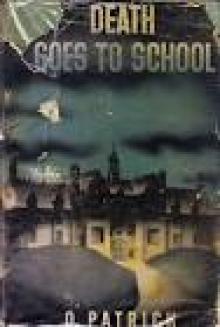 Death Goes to School
Death Goes to School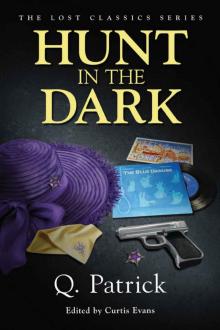 Hunt in the Dark
Hunt in the Dark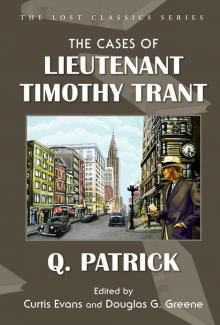 The Cases of Lieutenant Timothy Trant (Lost Classics)
The Cases of Lieutenant Timothy Trant (Lost Classics)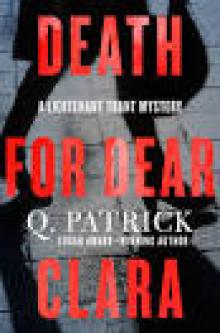 Death for Dear Clara
Death for Dear Clara S.S. Murder
S.S. Murder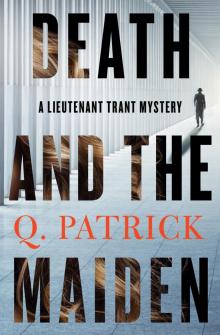 Death and the Maiden
Death and the Maiden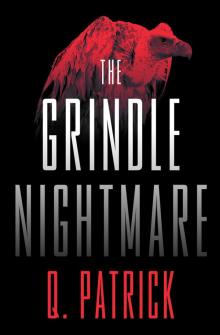 The Grindle Nightmare
The Grindle Nightmare Cottage Sinister
Cottage Sinister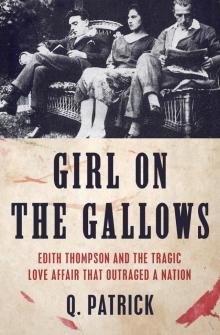 The Girl on the Gallows
The Girl on the Gallows